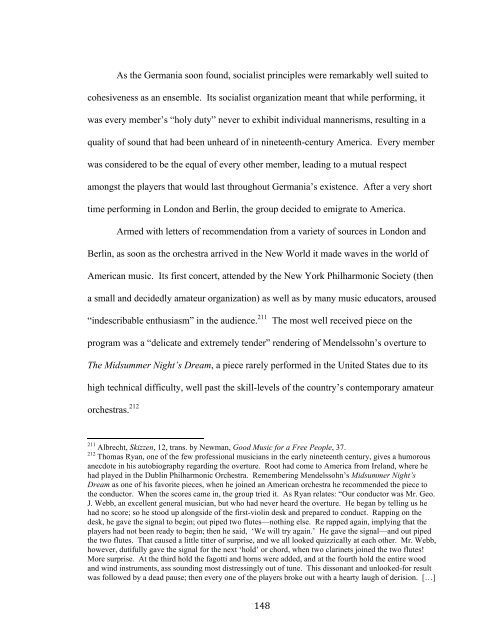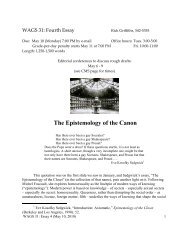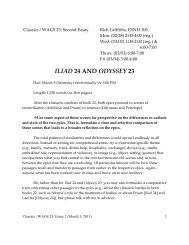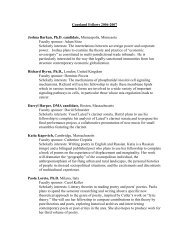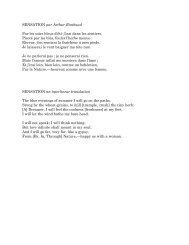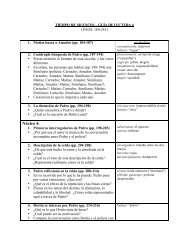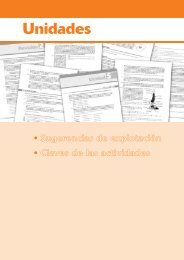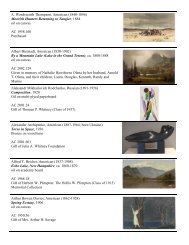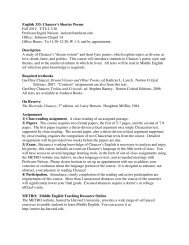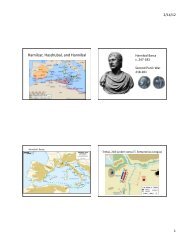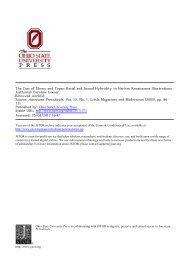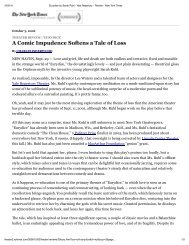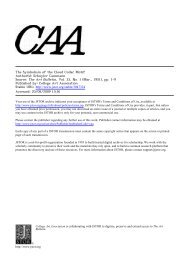Finding Their Voices - Amherst College
Finding Their Voices - Amherst College
Finding Their Voices - Amherst College
You also want an ePaper? Increase the reach of your titles
YUMPU automatically turns print PDFs into web optimized ePapers that Google loves.
As the Germania soon found, socialist principles were remarkably well suited to<br />
cohesiveness as an ensemble. Its socialist organization meant that while performing, it<br />
was every member’s “holy duty” never to exhibit individual mannerisms, resulting in a<br />
quality of sound that had been unheard of in nineteenth-century America. Every member<br />
was considered to be the equal of every other member, leading to a mutual respect<br />
amongst the players that would last throughout Germania’s existence. After a very short<br />
time performing in London and Berlin, the group decided to emigrate to America.<br />
Armed with letters of recommendation from a variety of sources in London and<br />
Berlin, as soon as the orchestra arrived in the New World it made waves in the world of<br />
American music. Its first concert, attended by the New York Philharmonic Society (then<br />
a small and decidedly amateur organization) as well as by many music educators, aroused<br />
“indescribable enthusiasm” in the audience. 211 The most well received piece on the<br />
program was a “delicate and extremely tender” rendering of Mendelssohn’s overture to<br />
The Midsummer Night’s Dream, a piece rarely performed in the United States due to its<br />
high technical difficulty, well past the skill-levels of the country’s contemporary amateur<br />
orchestras. 212<br />
!!!!!!!!!!!!!!!!!!!!!!!!!!!!!!!!!!!!!!!!!!!!!!!!!!!!!!!!<br />
211 Albrecht, Skizzen, 12, trans. by Newman, Good Music for a Free People, 37.<br />
212 Thomas Ryan, one of the few professional musicians in the early nineteenth century, gives a humorous<br />
anecdote in his autobiography regarding the overture. Root had come to America from Ireland, where he<br />
had played in the Dublin Philharmonic Orchestra. Remembering Mendelssohn’s Midsummer Night’s<br />
Dream as one of his favorite pieces, when he joined an American orchestra he recommended the piece to<br />
the conductor. When the scores came in, the group tried it. As Ryan relates: “Our conductor was Mr. Geo.<br />
J. Webb, an excellent general musician, but who had never heard the overture. He began by telling us he<br />
had no score; so he stood up alongside of the first-violin desk and prepared to conduct. Rapping on the<br />
desk, he gave the signal to begin; out piped two flutes—nothing else. Re rapped again, implying that the<br />
players had not been ready to begin; then he said, ‘We will try again.’ He gave the signal—and out piped<br />
the two flutes. That caused a little titter of surprise, and we all looked quizzically at each other. Mr. Webb,<br />
however, dutifully gave the signal for the next ‘hold’ or chord, when two clarinets joined the two flutes!<br />
More surprise. At the third hold the fagotti and horns were added, and at the fourth hold the entire wood<br />
and wind instruments, ass sounding most distressingly out of tune. This dissonant and unlooked-for result<br />
was followed by a dead pause; then every one of the players broke out with a hearty laugh of derision. […]<br />
! 148!


